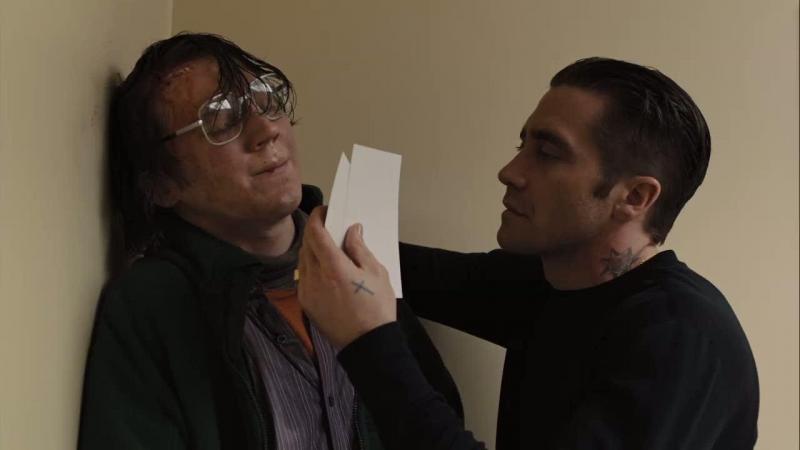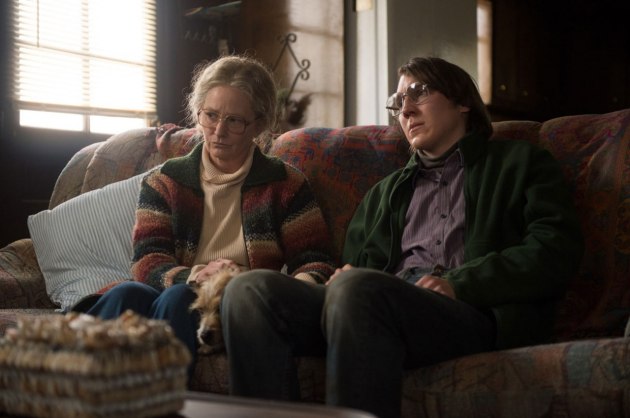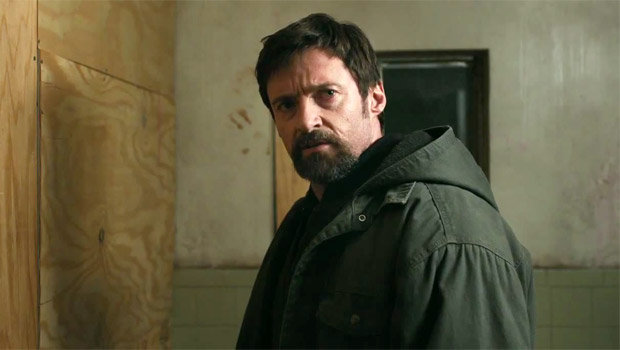Prisoners | reviews, news & interviews
Prisoners
Prisoners
Jake Gyllenhaal and Hugh Jackman spar over a missing child in an ambitious crime epic

What would you do if your six-year-old daughter vanished in broad daylight, and the man you’re sure took her is walking free? The answer for Keller Dover (Hugh Jackman, pictured bottom left) is as plain as the paranoid survivalist’s stockpiles that fill his basement. But his direct action against Alex Jones (Paul Dano), the apparently child-like man he’s sure is a monster, ripples against multiple traumas and secrets in this crime film of novelistic breadth.
The most interesting character in Prisoners’ superbly cast assembly of victims and victim-predators isn’t Jackman’s shattered vigilante, a selfless Maria Bello as his stunned, shrinking wife, Terrence Howard as the amiable friend and shocked accomplice in retribution whose daughter was also stolen, Paul Dano’s latest vulnerable, dangerous misfit, or The Fighter’s Melissa Leo, unrecognisable as his grey-haired, flinty aunt (Leo is pictured left with Dano below).
 No, the creation that really lingers in the memory is Jake Gyllenhaal’s Detective Loki. The first time you see him, alone in a diner in the working-class Pennsylvania suburb where two children are lost, he seems like the sort of man who might have them. His eyes twitch with tiredness under werewolf-thick brows. He says little, instead simmering watchfully, his damped-down violence occasionally exploding. In a film stuffed with hidden compartments and cages, physical and mental, he plainly has plenty. It’s a great performance, built on stoically silent fury, and a stillness so intense it nearly quivers. Gyllenhaal gives what could be just another brilliant, damaged cop human weight of black hole gravity.
No, the creation that really lingers in the memory is Jake Gyllenhaal’s Detective Loki. The first time you see him, alone in a diner in the working-class Pennsylvania suburb where two children are lost, he seems like the sort of man who might have them. His eyes twitch with tiredness under werewolf-thick brows. He says little, instead simmering watchfully, his damped-down violence occasionally exploding. In a film stuffed with hidden compartments and cages, physical and mental, he plainly has plenty. It’s a great performance, built on stoically silent fury, and a stillness so intense it nearly quivers. Gyllenhaal gives what could be just another brilliant, damaged cop human weight of black hole gravity.
 There’s a lot to admire about Prisoners. Aaron Guzikowski’s screenplay has the range and realism of one of Richard Price or George Pelecanos’s epic crime novels. Director Denis Villeneuve finds a quietly sinister, defeated atmosphere in his grey American town’s winter nights. Actually shot in an Atlanta suburb, Conyers, Pennsylvania doesn’t even seem a happy place in the opening minutes, as the Dovers and Birches relax at Thanksgiving with their kids. The dread of an accident waiting to happen, of streets secretly prowled by wolves, is there from the start.
There’s a lot to admire about Prisoners. Aaron Guzikowski’s screenplay has the range and realism of one of Richard Price or George Pelecanos’s epic crime novels. Director Denis Villeneuve finds a quietly sinister, defeated atmosphere in his grey American town’s winter nights. Actually shot in an Atlanta suburb, Conyers, Pennsylvania doesn’t even seem a happy place in the opening minutes, as the Dovers and Birches relax at Thanksgiving with their kids. The dread of an accident waiting to happen, of streets secretly prowled by wolves, is there from the start.
This is a film where everyone worked honestly and well. Why, then, doesn’t Prisoners convince me? Guzikowski has crafted a fine thriller plot and many memorable characters. But each gets in the way of the other. There’s too much loaded contrivance, and multiple points of view spread the cast thinly through a leisurely 2 ½ hours. Villeneuve’s subtle touch, admirable in so many ways, also makes him pull his punches. As with Peter Jackson’s The Lovely Bones, it’s a relief not to have to wallow in the potentially awful crimes against children which Prisoners portrays. But polite veils are pulled down too often. The full nightmare never arrives, or seems likely to. Finally, Prisoners is true to its narrative’s nature, burying its best effects, some of which bloom and haunt days later. It adds up to less while it’s actually on.
Overleaf: watch the trailer for Prisoners
What would you do if your six-year-old daughter vanished in broad daylight, and the man you’re sure took her is walking free? The answer for Keller Dover (Hugh Jackman, pictured bottom left) is as plain as the paranoid survivalist’s stockpiles that fill his basement. But his direct action against Alex Jones (Paul Dano), the apparently child-like man he’s sure is a monster, ripples against multiple traumas and secrets in this crime film of novelistic breadth.
The most interesting character in Prisoners’ superbly cast assembly of victims and victim-predators isn’t Jackman’s shattered vigilante, a selfless Maria Bello as his stunned, shrinking wife, Terrence Howard as the amiable friend and shocked accomplice in retribution whose daughter was also stolen, Paul Dano’s latest vulnerable, dangerous misfit, or The Fighter’s Melissa Leo, unrecognisable as his grey-haired, flinty aunt (Leo is pictured left with Dano below).
 No, the creation that really lingers in the memory is Jake Gyllenhaal’s Detective Loki. The first time you see him, alone in a diner in the working-class Pennsylvania suburb where two children are lost, he seems like the sort of man who might have them. His eyes twitch with tiredness under werewolf-thick brows. He says little, instead simmering watchfully, his damped-down violence occasionally exploding. In a film stuffed with hidden compartments and cages, physical and mental, he plainly has plenty. It’s a great performance, built on stoically silent fury, and a stillness so intense it nearly quivers. Gyllenhaal gives what could be just another brilliant, damaged cop human weight of black hole gravity.
No, the creation that really lingers in the memory is Jake Gyllenhaal’s Detective Loki. The first time you see him, alone in a diner in the working-class Pennsylvania suburb where two children are lost, he seems like the sort of man who might have them. His eyes twitch with tiredness under werewolf-thick brows. He says little, instead simmering watchfully, his damped-down violence occasionally exploding. In a film stuffed with hidden compartments and cages, physical and mental, he plainly has plenty. It’s a great performance, built on stoically silent fury, and a stillness so intense it nearly quivers. Gyllenhaal gives what could be just another brilliant, damaged cop human weight of black hole gravity.
 There’s a lot to admire about Prisoners. Aaron Guzikowski’s screenplay has the range and realism of one of Richard Price or George Pelecanos’s epic crime novels. Director Denis Villeneuve finds a quietly sinister, defeated atmosphere in his grey American town’s winter nights. Actually shot in an Atlanta suburb, Conyers, Pennsylvania doesn’t even seem a happy place in the opening minutes, as the Dovers and Birches relax at Thanksgiving with their kids. The dread of an accident waiting to happen, of streets secretly prowled by wolves, is there from the start.
There’s a lot to admire about Prisoners. Aaron Guzikowski’s screenplay has the range and realism of one of Richard Price or George Pelecanos’s epic crime novels. Director Denis Villeneuve finds a quietly sinister, defeated atmosphere in his grey American town’s winter nights. Actually shot in an Atlanta suburb, Conyers, Pennsylvania doesn’t even seem a happy place in the opening minutes, as the Dovers and Birches relax at Thanksgiving with their kids. The dread of an accident waiting to happen, of streets secretly prowled by wolves, is there from the start.
This is a film where everyone worked honestly and well. Why, then, doesn’t Prisoners convince me? Guzikowski has crafted a fine thriller plot and many memorable characters. But each gets in the way of the other. There’s too much loaded contrivance, and multiple points of view spread the cast thinly through a leisurely 2 ½ hours. Villeneuve’s subtle touch, admirable in so many ways, also makes him pull his punches. As with Peter Jackson’s The Lovely Bones, it’s a relief not to have to wallow in the potentially awful crimes against children which Prisoners portrays. But polite veils are pulled down too often. The full nightmare never arrives, or seems likely to. Finally, Prisoners is true to its narrative’s nature, burying its best effects, some of which bloom and haunt days later. It adds up to less while it’s actually on.
Overleaf: watch the trailer for Prisoners
The future of Arts Journalism
You can stop theartsdesk.com closing!
We urgently need financing to survive. Our fundraising drive has thus far raised £33,000 but we need to reach £100,000 or we will be forced to close. Please contribute here: https://gofund.me/c3f6033d
And if you can forward this information to anyone who might assist, we’d be grateful.

Subscribe to theartsdesk.com
Thank you for continuing to read our work on theartsdesk.com. For unlimited access to every article in its entirety, including our archive of more than 15,000 pieces, we're asking for £5 per month or £40 per year. We feel it's a very good deal, and hope you do too.
To take a subscription now simply click here.
And if you're looking for that extra gift for a friend or family member, why not treat them to a theartsdesk.com gift subscription?
more Film
 theartsdesk Q&A: director Leonardo Van Dijl discusses his sexual abuse drama 'Julie Keeps Quiet'
The Belgian filmmaker unfolds an all too familiar tragedy in the world of tennis
theartsdesk Q&A: director Leonardo Van Dijl discusses his sexual abuse drama 'Julie Keeps Quiet'
The Belgian filmmaker unfolds an all too familiar tragedy in the world of tennis
 DVD/Blu-ray: All We Imagine as Light
Epic but intimate Cannes prize-winner, ripe for repeated viewings
DVD/Blu-ray: All We Imagine as Light
Epic but intimate Cannes prize-winner, ripe for repeated viewings
 The Accountant 2 review - belated return of Ben Affleck's lethal bean-counter
Horror, humour and mind games combine in Gavin O'Connor's sequel
The Accountant 2 review - belated return of Ben Affleck's lethal bean-counter
Horror, humour and mind games combine in Gavin O'Connor's sequel
 The Ugly Stepsister review - gleeful Grimm revamp
A cutting Norwegian take on Cinderella and her adversaries
The Ugly Stepsister review - gleeful Grimm revamp
A cutting Norwegian take on Cinderella and her adversaries
 April review - powerfully acted portrait of a conflicted doctor in eastern Georgia
Dea Kukumbegashvili's second film is stylistically striking and emotionally raw
April review - powerfully acted portrait of a conflicted doctor in eastern Georgia
Dea Kukumbegashvili's second film is stylistically striking and emotionally raw
 theartsdesk Q&A: filmmaker Miguel Gomes on his latest exotic opus, 'Grand Tour'
The Portuguese director's comic melodrama takes a fantastical journey through Southeast Asia and the history of cinema
theartsdesk Q&A: filmmaker Miguel Gomes on his latest exotic opus, 'Grand Tour'
The Portuguese director's comic melodrama takes a fantastical journey through Southeast Asia and the history of cinema
 Neil Young: Coastal review - the old campaigner gets back on the trail
Young's first post-Covid tour documented by Daryl Hannah
Neil Young: Coastal review - the old campaigner gets back on the trail
Young's first post-Covid tour documented by Daryl Hannah
 The Penguin Lessons review - Steve Coogan and his flippered friend
P-p-p-pick up a penguin... few surprises in this boarding school comedy set in Argentina during the coup
The Penguin Lessons review - Steve Coogan and his flippered friend
P-p-p-pick up a penguin... few surprises in this boarding school comedy set in Argentina during the coup
 Blue Road: The Edna O'Brien Story - compelling portrait of the ground-breaking Irish writer
Glitz and hard graft: Sinéad O'Shea writes and directs this excellent documentary
Blue Road: The Edna O'Brien Story - compelling portrait of the ground-breaking Irish writer
Glitz and hard graft: Sinéad O'Shea writes and directs this excellent documentary
 DVD/Blu-ray: In a Year of 13 Moons
UK disc debut for Fassbinder's neglected, tragic, tender trans tale
DVD/Blu-ray: In a Year of 13 Moons
UK disc debut for Fassbinder's neglected, tragic, tender trans tale
 The Amateur review - revenge of the nerd
Remi Malek's computer geek goes on a cerebral killing spree
The Amateur review - revenge of the nerd
Remi Malek's computer geek goes on a cerebral killing spree

Add comment